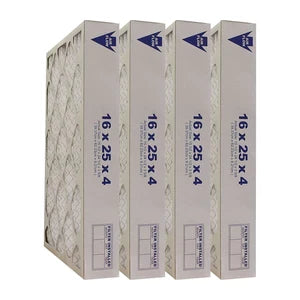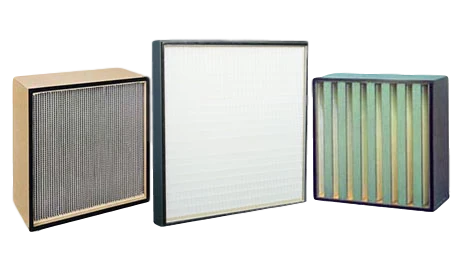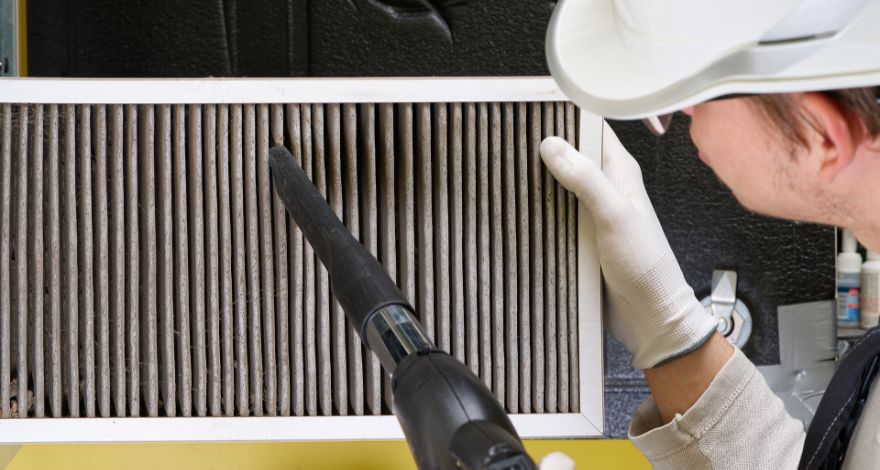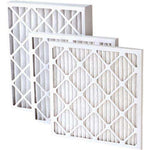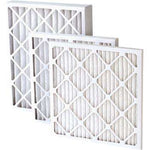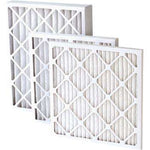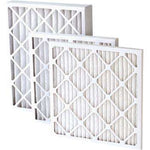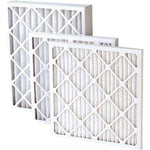Vous avez pas d'articles dans votre panier.
From Ground to Air: How Filters Protect the Power of Your Geothermal System
A geothermal system uses a high-quality filter to keep your home feeling comfortable during hot summers and cooler winters. However, every homeowner needs to be aware of how these filters work and when replacements are due.
Why? To ensure the geothermal system keeps working seamlessly and the indoor air quality in your home stays at a high level.
So, what type of filter does a geothermal system use? What are the benefits of these filters? And who should get quality furnace filters in Canada?
Below, you'll learn about the two main filter types: air and water filters, the five amazing perks of investing in these unique filters, and much more.

What Is a Geothermal System and How Does It Work?
Geothermal systems are one of the best green solutions to keep your living area feeling cozy and comfortable all year round. These heating and cooling systems work by harnessing the stable temperature below the surface of the earth to regulate your home's climate.
For example, in winter, a geothermal system will extract heat from the ground and use it to warm up your home. In summer months when everyone's feeling sweaty, the process gets reversed.
The geothermal system draws heat away from your home and transfers it into the cooler ground. It's a renewable energy system that's an effective alternative to traditional HVACs.
However, they still usually rely on conventional components such as air filters to keep the air quality high and the system working properly.
What Type of Filter Does a Geothermal System Use?
In most cases, geothermal systems use regular HVAC air filters which are similar to those located in forced-air heating and cooling systems.
You can find these filters in the return air duct close to the heat pump and air handler. The job of the filter is to trap airborne particles like dust, mould spores, lint, pollen, and pet dander.
Some setups include a water filter, especially those using an open-loop system. The role of a water filter is to remove minerals, sediment, and contaminants that can clog sensitive parts like the heat exchanger.
What is a MERV Rating and Why Should I Pay Close Attention To It?
The term "MERV rating" stands for Minimum Efficiency Reporting Value rating, and it shows how effectively the air filter traps tiny particles like lint.
The most popular MERV ratings are between 8-13. MERV 8 is a great option for standard residential homes without pets and zero allergies.
For enhanced filtration, choose MERV 11 furnace filters, as they are most suitable for the majority of households looking to increase IAQ.
MERV 13 offers superior filtration, and we recommend this option to people with multiple pets or household members dealing with allergies or asthma.

5 Benefits of Using Quality Filters in a Geothermal System
There are many reasons why anyone should get the best air filters for furnace. These filters are the ultimate solution if you want to improve the overall health and comfort of your entire family.
-
Get quality geothermal system filters to improve IAQ: Above all, a quality filter for a geothermal system will increase indoor air quality making it fresher and cleaner.
Again, if you or a loved one deal with respiratory problems or allergies, get a good filter for your geothermal system.
-
Extend the geothermal system's lifespan: Low-quality filters can easily wreck your geothermal system, so you'll end up with costly repairs and maybe even full replacements.
Instead, get quality filters to protect the internal components of your system, like the blower fan. The right filters help prevent sudden mechanical failures and maximize the lifespan of the unit.
-
Low maintenance costs: This perk ties into the previous one; you'll save a lot of money by investing in a quality filter. Routine filter replacement is a budget-friendly way to prevent costly repairs.
Stay on track with regular replacements and you won't have to worry about system lockouts or frozen coils.
-
Increased energy efficiency: A clean, high-quality filter for your geothermal system will allow air to flow freely, so there's no extra strain on the unit.
On the other hand, if you keep using a dirty and clogged filter, it can force the heat pump to work harder. This means premature wear and extra high energy bills at the end of the month!
-
Feel comfortable: No matter whether it's the peak of June or January, you'll feel good staying in your home. With a quality filter, the temperature indoors will feel comfortable, no matter what it's like outside!
How Often Should You Replace Geothermal Filters?
Speaking of replacements, how often should you switch out a dirty filter with a brand-new one? The replacement frequency for geothermal system filters may vary, depending on the MERV rating, usage, and your overall home environment.
For example, higher-rated filters, like MERV 11 and MERV 13 work hard, so we recommend replacing them every three months. If you run your system almost every day, you may need to change the filters more frequently.
Also, if you have multiple dogs or cats, or someone who smokes, monthly geothermal filter changes may be necessary. Remember to also check the water filter every three to six months.
How to Choose the Right Filter for Your Geothermal System?
If you choose the wrong filter, it might not fit the system or it may even reduce its efficacy. So, make sure you start by checking the size of the filter. Usually, you can find the correct size measurements in the user manual of your geothermal unit or on the old filter.
Most importantly, consider the air filter type.
You can choose between fibreglass, pleated, electrostatic, and HEPA options. The most affordable option for a geothermal system filter is usually fibreglass. In most cases, HEPA is only compatible if the system is specially designed for it.
Next, confirm the MERV rating compatibility, and remember that higher is not always better. As you know, the standard option is a MERV 11 furnace filter, as it is suitable for most households with pets and allergies.
The reputation of the company you buy the filter from also matters. Look for a well-reviewed and transparent provider, such as United Filter. We are a reputable distributor and manufacturer of filtration or Furnace Filter or Air Filter products. Order today and enjoy fast shipping in Canada and the United States.

How Do I Know If I Need to Replace My Old Geothermal System Filter?
You'll definitely know when it's time to take out the old geothermal system filter and put in a new one. Usually, the air will start to feel funky and if you have allergies, the symptoms may get worse indoors.
There are many other signs, like:
-
Noticing dust buildup around vents
-
Higher utility bills than normal
-
Visible discoloration or dirt on the old filter
-
Reduced airflow or cold/hot spots in your home
It's best to not wait for these signs that a filter replacement is due. Instead, take a mental note (or write down the date when you did the replacement the last time) so you check the filter regularly.
What about using a smart filter or a sensor? It’s possible. Some newer geothermal system models are compatible with smart air quality monitors or filter sensors. These can alert you when it's time to replace the old filter based on usage.
Geothermal Filters FAQ
Can I use any HVAC filter in my geothermal system?
Usually, it's not possible. We recommend using the MERV rating and filter size recommended by the manufacturer. If you use the wrong type of filter, you may reduce the performance of the geothermal system.
How do I find my filter size?
The best thing to do is check the filter you already have in your geothermal system and look for the dimensions printed on the frame. Alternatively, check the size in the manual.
Is a higher MERV always better?
Not always, because a higher MERV rating may also increase the airflow resistance. So, while higher ratings can trap smaller particles, choosing these isn't always the best idea. Opt for a higher MERV rating if your geothermal system can handle it.
Are washable filters a good option?
Washable filters are more sustainable, but they often have lower MERV ratings and aren't as effective in improving IAQ.
Do geothermal systems need more maintenance than standard HVAC systems?
It all depends on how often you use your geothermal system. Changing the filter regularly is just as important as with traditional systems.
Are furnace filters expensive?
Higher-quality furnace filters won’t be cheap, but they shouldn’t be too expensive. If you’re looking for premium options on a budget, consider our discount furnace filters.

Order the Best Air Filters for Furnace NOW
What type of filter does a geothermal system use? It can use an air and water filter, the latter of which can be found in open-loop geothermal systems. The most common subtypes of air filters compatible with geothermal systems include pleated, fibreglass, and electrostatic. Usually, HEPA isn't a compatible option.
If you're ready to upgrade your geothermal system with high-quality filters, contact United Filter. Besides geothermal filters, we also offer bag filters, rigid box filters, HEPA filters, and various sizes of furnace filters (from 1" to 5"). Call (905) 403-0160 and order top-rated furnace filters in Canada now!
From Ground to Air: How Filters Protect the Power of Your Geothermal System
A geothermal system uses a high-quality filter to keep your home feeling comfortable during hot summers and cooler winters. However, every homeowner needs to be aware of how these filters work and when replacements are due.
Why? To ensure the geothermal system keeps working seamlessly and the indoor air quality in your home stays at a high level.
So, what type of filter does a geothermal system use? What are the benefits of these filters? And who should get quality furnace filters in Canada?
Below, you'll learn about the two main filter types: air and water filters, the five amazing perks of investing in these unique filters, and much more.

What Is a Geothermal System and How Does It Work?
Geothermal systems are one of the best green solutions to keep your living area feeling cozy and comfortable all year round. These heating and cooling systems work by harnessing the stable temperature below the surface of the earth to regulate your home's climate.
For example, in winter, a geothermal system will extract heat from the ground and use it to warm up your home. In summer months when everyone's feeling sweaty, the process gets reversed.
The geothermal system draws heat away from your home and transfers it into the cooler ground. It's a renewable energy system that's an effective alternative to traditional HVACs.
However, they still usually rely on conventional components such as air filters to keep the air quality high and the system working properly.
What Type of Filter Does a Geothermal System Use?
In most cases, geothermal systems use regular HVAC air filters which are similar to those located in forced-air heating and cooling systems.
You can find these filters in the return air duct close to the heat pump and air handler. The job of the filter is to trap airborne particles like dust, mould spores, lint, pollen, and pet dander.
Some setups include a water filter, especially those using an open-loop system. The role of a water filter is to remove minerals, sediment, and contaminants that can clog sensitive parts like the heat exchanger.
What is a MERV Rating and Why Should I Pay Close Attention To It?
The term "MERV rating" stands for Minimum Efficiency Reporting Value rating, and it shows how effectively the air filter traps tiny particles like lint.
The most popular MERV ratings are between 8-13. MERV 8 is a great option for standard residential homes without pets and zero allergies.
For enhanced filtration, choose MERV 11 furnace filters, as they are most suitable for the majority of households looking to increase IAQ.
MERV 13 offers superior filtration, and we recommend this option to people with multiple pets or household members dealing with allergies or asthma.

5 Benefits of Using Quality Filters in a Geothermal System
There are many reasons why anyone should get the best air filters for furnace. These filters are the ultimate solution if you want to improve the overall health and comfort of your entire family.
-
Get quality geothermal system filters to improve IAQ: Above all, a quality filter for a geothermal system will increase indoor air quality making it fresher and cleaner.
Again, if you or a loved one deal with respiratory problems or allergies, get a good filter for your geothermal system.
-
Extend the geothermal system's lifespan: Low-quality filters can easily wreck your geothermal system, so you'll end up with costly repairs and maybe even full replacements.
Instead, get quality filters to protect the internal components of your system, like the blower fan. The right filters help prevent sudden mechanical failures and maximize the lifespan of the unit.
-
Low maintenance costs: This perk ties into the previous one; you'll save a lot of money by investing in a quality filter. Routine filter replacement is a budget-friendly way to prevent costly repairs.
Stay on track with regular replacements and you won't have to worry about system lockouts or frozen coils.
-
Increased energy efficiency: A clean, high-quality filter for your geothermal system will allow air to flow freely, so there's no extra strain on the unit.
On the other hand, if you keep using a dirty and clogged filter, it can force the heat pump to work harder. This means premature wear and extra high energy bills at the end of the month!
-
Feel comfortable: No matter whether it's the peak of June or January, you'll feel good staying in your home. With a quality filter, the temperature indoors will feel comfortable, no matter what it's like outside!
How Often Should You Replace Geothermal Filters?
Speaking of replacements, how often should you switch out a dirty filter with a brand-new one? The replacement frequency for geothermal system filters may vary, depending on the MERV rating, usage, and your overall home environment.
For example, higher-rated filters, like MERV 11 and MERV 13 work hard, so we recommend replacing them every three months. If you run your system almost every day, you may need to change the filters more frequently.
Also, if you have multiple dogs or cats, or someone who smokes, monthly geothermal filter changes may be necessary. Remember to also check the water filter every three to six months.
How to Choose the Right Filter for Your Geothermal System?
If you choose the wrong filter, it might not fit the system or it may even reduce its efficacy. So, make sure you start by checking the size of the filter. Usually, you can find the correct size measurements in the user manual of your geothermal unit or on the old filter.
Most importantly, consider the air filter type.
You can choose between fibreglass, pleated, electrostatic, and HEPA options. The most affordable option for a geothermal system filter is usually fibreglass. In most cases, HEPA is only compatible if the system is specially designed for it.
Next, confirm the MERV rating compatibility, and remember that higher is not always better. As you know, the standard option is a MERV 11 furnace filter, as it is suitable for most households with pets and allergies.
The reputation of the company you buy the filter from also matters. Look for a well-reviewed and transparent provider, such as United Filter. We are a reputable distributor and manufacturer of filtration or Furnace Filter or Air Filter products. Order today and enjoy fast shipping in Canada and the United States.

How Do I Know If I Need to Replace My Old Geothermal System Filter?
You'll definitely know when it's time to take out the old geothermal system filter and put in a new one. Usually, the air will start to feel funky and if you have allergies, the symptoms may get worse indoors.
There are many other signs, like:
-
Noticing dust buildup around vents
-
Higher utility bills than normal
-
Visible discoloration or dirt on the old filter
-
Reduced airflow or cold/hot spots in your home
It's best to not wait for these signs that a filter replacement is due. Instead, take a mental note (or write down the date when you did the replacement the last time) so you check the filter regularly.
What about using a smart filter or a sensor? It’s possible. Some newer geothermal system models are compatible with smart air quality monitors or filter sensors. These can alert you when it's time to replace the old filter based on usage.
Geothermal Filters FAQ
Can I use any HVAC filter in my geothermal system?
Usually, it's not possible. We recommend using the MERV rating and filter size recommended by the manufacturer. If you use the wrong type of filter, you may reduce the performance of the geothermal system.
How do I find my filter size?
The best thing to do is check the filter you already have in your geothermal system and look for the dimensions printed on the frame. Alternatively, check the size in the manual.
Is a higher MERV always better?
Not always, because a higher MERV rating may also increase the airflow resistance. So, while higher ratings can trap smaller particles, choosing these isn't always the best idea. Opt for a higher MERV rating if your geothermal system can handle it.
Are washable filters a good option?
Washable filters are more sustainable, but they often have lower MERV ratings and aren't as effective in improving IAQ.
Do geothermal systems need more maintenance than standard HVAC systems?
It all depends on how often you use your geothermal system. Changing the filter regularly is just as important as with traditional systems.
Are furnace filters expensive?
Higher-quality furnace filters won’t be cheap, but they shouldn’t be too expensive. If you’re looking for premium options on a budget, consider our discount furnace filters.

Order the Best Air Filters for Furnace NOW
What type of filter does a geothermal system use? It can use an air and water filter, the latter of which can be found in open-loop geothermal systems. The most common subtypes of air filters compatible with geothermal systems include pleated, fibreglass, and electrostatic. Usually, HEPA isn't a compatible option.
If you're ready to upgrade your geothermal system with high-quality filters, contact United Filter. Besides geothermal filters, we also offer bag filters, rigid box filters, HEPA filters, and various sizes of furnace filters (from 1" to 5"). Call (905) 403-0160 and order top-rated furnace filters in Canada now!
